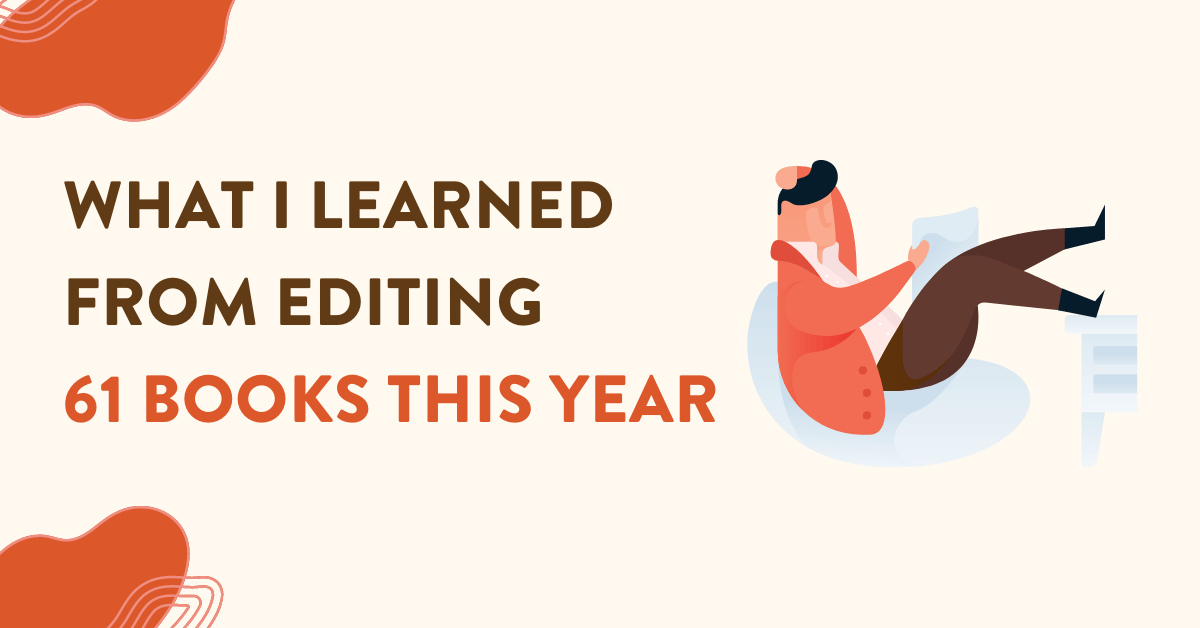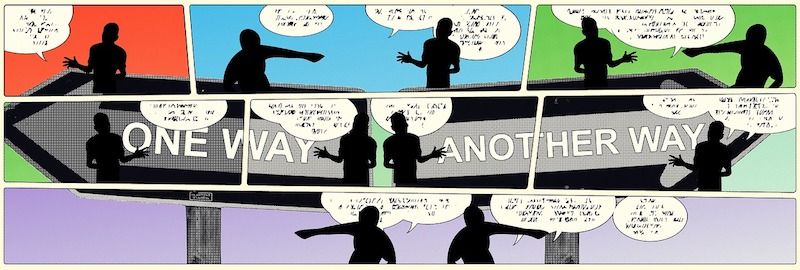 As a full time editor, I read and gave feedback on 61 books this year. For those of you who wonder how this is possible, for most books I am not copyediting them, only (only!) giving feedback about every part of the fictional world — plot, characters, dialogue, beginnings/endings, themes, structure, metaphors, etc.
As a full time editor, I read and gave feedback on 61 books this year. For those of you who wonder how this is possible, for most books I am not copyediting them, only (only!) giving feedback about every part of the fictional world — plot, characters, dialogue, beginnings/endings, themes, structure, metaphors, etc.
I’m basically a story doctor, helping writers tell better stories.
Now, when I say 61 books, I’m not counting short story editing or children’s book editing any other short forms. I’m talking about novels and novellas — long form fiction.
What did I learn from this experience? A lot, actually. And I’m going to tell you all about it, so you can have even more street-smarts for the next book you write.
1. What Writers Think Is Wrong With Their Book Is Often Not What’s Wrong
 Most of the time when writers ask me to focus on X, Y, and Z for their book, because they’re really struggling with those elements, those parts are pretty decent. It’s probably a psychological trick: when writers are aware of a weakness, they work hard to fix it.
Most of the time when writers ask me to focus on X, Y, and Z for their book, because they’re really struggling with those elements, those parts are pretty decent. It’s probably a psychological trick: when writers are aware of a weakness, they work hard to fix it.
And so I’m stuck with the odd position of praising the parts they asked for help with, but saying that actually parts A, B, and C (which weren’t on their radars) is what needs the most work.
This is why outside voices are so helpful to give you a better awareness of how other people might read your book. Early readers can’t ever give you a 360 vision of your book, but they can help fill in some of your blind spots, and an editor works as a kind of chorus of readers, trying to give you feedback on how a bunch of other readers might view it.
2. Writers Underestimate Their Skills
 Writers are often really surprised by the amount of praise I give, and also by what I praise. Apparently, they weren’t aware of everything they were awesome at!
Writers are often really surprised by the amount of praise I give, and also by what I praise. Apparently, they weren’t aware of everything they were awesome at!
But I think writers should be just as cognizant of their strengths as they are about their weaknesses. If you’re aware of your strengths, you can play to them, creating the type of narratives that work to your advantage.
And let’s be honest: writing can be a soul-crushing business. So absolutely you should celebrate the fact that there are 99 things about your book which are working fireworks-on-fourth-of-July well. Right?
Because if you don’t have that celebration, if you just obsess about the 12 big things you need to change, it’s too depressing, and you’ll end up without the willpower to make those revisions.
3. Writers Underestimate The Amount of Revision Needed
 Look, I know this can be a huge downer. I don’t mean to shove a sad-Sally reality down your gullets, but by the time you’re getting your work to an editor, you might only be about halfway or two-thirds of the way through the writing process. Every book is different, but you should be prepared for some serious revision.
Look, I know this can be a huge downer. I don’t mean to shove a sad-Sally reality down your gullets, but by the time you’re getting your work to an editor, you might only be about halfway or two-thirds of the way through the writing process. Every book is different, but you should be prepared for some serious revision.
As long as you have that kind of expectation, then you’re going to be pumped to get feedback. You’ll know what to change and be ready to spend time on it. But when I give feedback, some things are not click-and-switch solutions. Some things require painful cuts, or radical changes.
It’s great to be optimistic about your book, but don’t let that optimism sabotage your willpower for spending the necessary time for revision.
4. The Dirty Secret About POV
 Writers are always wondering whether the plot is working, or whether a character is too cliche, or whether the story makes sense. They’re almost never thinking about: is this the right Point of View to tell this story? Or: am I switching between POVs in a way that will make sense for the reader?
Writers are always wondering whether the plot is working, or whether a character is too cliche, or whether the story makes sense. They’re almost never thinking about: is this the right Point of View to tell this story? Or: am I switching between POVs in a way that will make sense for the reader?
It’s because there’s something unsexy about POV. It’s something too basic.
But for almost every novel or novella I edit, I end up giving feedback on POV.
My most common point is about the subtle differences between 3rd person omniscient and 3rd person limited. And here’s the thing: I edit good writers, and they all know the difference. It’s not like I’m explaining the definitions. But there are so many nuances and subtleties with POV, that at some points a limited 3rd person will slip into omniscient, or an omniscient will not take advantage of its full range.
The second most common piece of advice is about POV switching. In a roving omniscient POV, where the narrator is switching between the POVs of multiple characters, writers often need help figuring out how, when, and how often to switch.
If all this is too technical or abstract for you, don’t worry — when it’s on the page, it makes a huge difference. And that’s why it’s important.
5. Writers Take Criticism Incredibly Well
 Maybe I’ve got fantastic clients, but everyone I edited is remarkably mature and humble about their books. They accept criticism with dignity and grace, and resolve to make changes with fortitude. Sometimes they don’t make all the changes I suggest, but I’m perfectly comfortable with that — after all, it’s their book, and they have to create what they are proud of.
Maybe I’ve got fantastic clients, but everyone I edited is remarkably mature and humble about their books. They accept criticism with dignity and grace, and resolve to make changes with fortitude. Sometimes they don’t make all the changes I suggest, but I’m perfectly comfortable with that — after all, it’s their book, and they have to create what they are proud of.
Nobody — really, nobody — has even emailed me back in an angry way. Some authors explain their reasoning behind a choice, which I love because then I can further explain why it worked or didn’t work for me, but it’s always been cordial.
I’m part of many author groups on Facebook, and so I know some clients exist who flare up and get insulted, but I’d like to suggest there are fewer of them than one might expect. So go ahead, writers: give yourself a round of applause. You are willing to listen to problems with your work and make changes.
And might I suggest that being able to do that with your work will make you a better human being in real life? I mean, if you can accept criticism with your novel, perhaps you can also accept criticism with your spouse, or with a boyfriend/girlfriend, or with a friend. Listening to your faults without getting defensive is one of the greatest life skills you could ever acquire.
6. Writers Tend to Be Wildly Optimistic
 And that’s not a bad thing! Sometimes you need to keep that optimism alive because you want such good things for the beautiful and wonderful book you’re writing!
And that’s not a bad thing! Sometimes you need to keep that optimism alive because you want such good things for the beautiful and wonderful book you’re writing!
But sometimes I doubt whether that optimism should always be directed toward grand visions of becoming the next massive international bestseller. I mean, it’s not a question of talent — I edited so many books this year that I flat-out loved (and by the way, I do have pristine taste in fiction. Wink, wink. But seriously. But wink wink because I shouldn’t say that about myself. But really, I do.).
The vast majority of books sell between 250 and 2000 copies. And I think every writer should be happy with that range, and if for some reason the stars align and you happen to sell a million more, bust out the celebratory drinks and count your good fortune.
 But it’s super important to remember you can be a wild success even if it’s not in traditional terms.
But it’s super important to remember you can be a wild success even if it’s not in traditional terms.
I mean, maybe success should not be in terms of books sold, reviews in the famous newspapers and magazines, or total amount that you earned from your advance, but whether someone emails you saying that they read your book out loud to their dying grandmother, and that she smiled at one of your character’s antics, and that was the last book they shared with her before she passed on.
Or maybe success is one of your good friends saying they read part of your story out loud in bed to their spouse, and they loved it and had a long conversation about it, and it revealed something about their marriage and their lives.
To me, those scenarios sound like true success.
7. The Idea Is Never as Important as the Execution
 Look, I think I mentioned I gave feedback on 61 books this year. In case you forgot, I’m going to mention it a few times more in this article.
Look, I think I mentioned I gave feedback on 61 books this year. In case you forgot, I’m going to mention it a few times more in this article.
And when clients pitch me their novel, I have varying levels of excitement. To be honest, almost all of them were really good pitches, and I was excited to read the books (and some of the ones that didn’t have good pitches ended up being really good books, but with pitches that needed revising).
But what separated the books for me was how those ideas were fleshed out in the garb of fiction. How the scenes were structured, what details were chosen, how well the characters were drawn.
Yes, absolutely you need a great idea for a book. But my point here is that most people have fantastic ideas. The execution is ever so much harder. And a publisher/agent will open that email attachment if you wow them with a fantastic idea, but they only buy the book if the execution is spot on.
(Sidenote: That’s why it’s an unfounded suspicion that some nefarious agent/publisher will steal an idea. Because they know as well as anybody that the execution is more important than the idea, and they’d much rather pay you if you’ve done the execution already.)
8. Structure is the Hardest Thing to Nail
 I’ve seen a lot of manuscripts with sentences that make my jaw drop and characters I want to befriend or hate.
I’ve seen a lot of manuscripts with sentences that make my jaw drop and characters I want to befriend or hate.
But for virtually every long-form manuscript I edited, there was a shift that needed to happen with the basic scaffolding of the novel:
- A chapter that needed to be shifted around
- An additional chapter that needed to be written
- An ending that needed to be expanded
- A middle that stretched on too long
That’s because for writers, structure is one of the hardest things to see neutrally. You’ve built this lovely thing and it’s hard to get enough distance. In fact, it’s hard to get far enough away where you can see the entire novel in one fell swoop — at least with a chapter, you can pinpoint the faults more easily because it’s more contained.
There’s no easy solution I have for helping authors with this, other than working with writers one-on-one. Because every novel has its own particular quirks and foibles.
9. There are So Many Talented Writers Out There
 Okay, maybe I’m self-selecting my audience here. I write about the writing life in a way that attracts great writers who want me to edit them. Okay, that’s a fair criticism (I’m a writer! I can take it!).
Okay, maybe I’m self-selecting my audience here. I write about the writing life in a way that attracts great writers who want me to edit them. Okay, that’s a fair criticism (I’m a writer! I can take it!).
But I will say that I’ve been consistently amazed by the talent I’ve seen this year. I have laughed my ass off at books, I have cried at books, I have been floored by the imagination of world-builders.
It has been such a pleasure editing so many books this year, and never felt burdensome. I am so grateful to be an editor that gets to interact with talented storytellers.
For you writers out there, don’t be intimidated by the sheer number of talented writers around you. Embrace it! How lucky we are to live in such an affluent, stable time when so many can devote themselves to the cause of beauty and storytelling. What an abundance of riches that we all — as readers — get to benefit from!
If you’re interested in editing services, please visit my Developmental Editing page.

10 comments
I really enjoy your articles, and all this information from an editor’s point of view is great. Damn, revising, it’s the WORST. My 2nd novel is being workshopped with my critique group right now and I’m taking the notes and storing them away for now, because it’s so overwhelming to think of all the changes I want to make. Working on my 3rd, and when that’s written (the fun part) I’ll go back and do edits on the 2nd. The struggle is real!
I loved this article. It’s was very insightful and encouraging. Now I’m pumped up to get more writing done.
thank you, this is really insightful and helpful.
Thank you for your thoughts, this was very informative…what a great job! Getting paid to read books!
Do you help with memoirs?
Hi, I was thinking about your point about POV, where you say that authors slide out of third person limited to third person omniscient. Would that mainly be a head-hopping problem? My novel has three MCs and is told in limited, third person POV in alternate chapters. Sometimes they opine, which I worry sounds like an omniscient narrator, but is really them giving their broad take on something.
Hi JC, no your novel sounds fine. As long as each chapter is limited 3rd person POV, and you’re not switching between character POVs inside the chapter, it sounds good.
that’s clear, thanks a lot
Hello Mr. John Fox, I just want you to know I did not forget about our conversation. I actually finished the work I discussed with you, but I had to revise a couple of paragraphs. I an giving myself 14 days, then I will send my work in with payment. Have a nice day.
“Execution matters more than the Big Idea.” This is an important lesson taught by Screen Writer Richard Walter in L.A. And this one makes me a little nervous. It’s the actual WRITING that makes a story eloquent and elegant. This is a great article: both encouraging and challenging (in a healthy way).